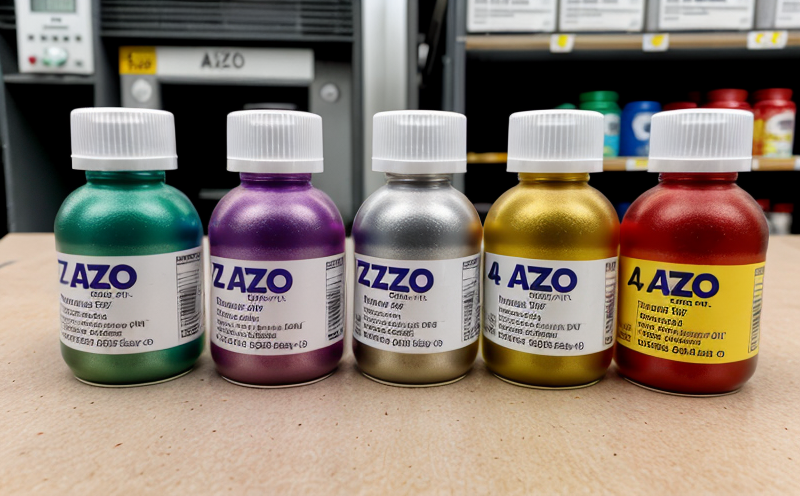JIS L1096 Testing of heavy metals and restricted amines in fabrics
The JIS L1096 standard is one of the most widely recognized specifications for testing the migration of heavy metals from textiles. This method ensures that textile products are safe for consumers, particularly those who may have prolonged contact with the fabric. The testing process involves extracting heavy metals such as lead, cadmium, chromium, nickel, and others using a phosphate buffer solution at physiological pH. The extracted elements are then quantified by inductively coupled plasma optical emission spectrometry (ICP-OES) or inductively coupled plasma mass spectrometry (ICP-MS).
For restricted amines testing under JIS L1096, the focus is on identifying potential skin sensitizers that could be released from textile products. This test ensures that the fabric does not contain harmful amines like 2-methylimidazole and N,N-diethylaniline. The process involves soaking the fabric in a buffer solution designed to mimic physiological conditions and then extracting any free amines present. These are analyzed using gas chromatography with mass spectrometry (GC-MS).
The testing procedure is meticulous, ensuring that every detail contributes to accurate results. Fabric samples must be prepared carefully by cutting them into small pieces of approximately 1 cm². The specimens should represent the fabric's surface area and not include any trimmings or accessories. Extraction solvents are chosen based on their ability to effectively dissolve potential contaminants without affecting the analytical process.
The JIS L1096 test is particularly important for industries that manufacture clothing, home textiles, and personal care products where prolonged skin contact is a concern. It helps manufacturers comply with international standards and regulations such as REACH (Registration, Evaluation, Authorization, and Restriction of Chemicals) in Europe and Proposition 65 in California.
The reliability of the test results depends heavily on the quality control measures implemented during sample preparation and analysis. This includes using calibrated equipment, ensuring consistent extraction conditions, and performing regular calibration checks to maintain precision. The expertise of our laboratory ensures that every step adheres strictly to JIS L1096 guidelines.
The significance of this test extends beyond compliance; it also plays a crucial role in product development and quality assurance. By identifying potential issues early in the production process, manufacturers can make necessary adjustments to their formulations or sourcing practices. This not only enhances consumer safety but also protects brand reputation and market share.
Our laboratory adheres strictly to JIS L1096 standards, ensuring that all tests are conducted with precision and accuracy. Our team of experts uses state-of-the-art equipment and follows rigorous protocols to deliver reliable results. Whether you're a manufacturer looking to ensure compliance or an R&D engineer seeking insights into product development, our services provide the assurance needed for high-quality textile products.
The JIS L1096 test is essential in the manufacturing of textiles that come into prolonged contact with skin. It ensures that all heavy metals and restricted amines are within safe limits to protect consumers from potential health risks. This standard not only promotes consumer safety but also enhances brand reputation by demonstrating a commitment to quality and compliance.
Eurolab Advantages
- State-of-the-Art Equipment: Our laboratory is equipped with the latest technology, including advanced analytical instruments such as ICP-OES/MS for heavy metals testing and GC-MS for restricted amines analysis.
- Expertise: Eurolab's team consists of highly qualified professionals who specialize in textile testing, ensuring accurate and reliable results.
- Prompt Turnaround Time: We pride ourselves on providing quick turnaround times without compromising the quality of our services.
- Comprehensive Reporting: Our reports are detailed and comprehensive, offering insights into all aspects of your product's compliance with JIS L1096 standards.
We understand that every client has unique needs. That's why we offer tailored solutions to meet those specific requirements. From consultation on best practices to ongoing support for regulatory changes, Eurolab is committed to being a partner in your journey towards product excellence.
International Acceptance and Recognition
- JIS L1096 is recognized globally as one of the leading standards for testing textile products. Its acceptance spans across countries like Japan, South Korea, Taiwan, Singapore, and other regions where stringent safety measures are enforced.
- The standard is widely adopted by international organizations such as ISO (International Organization for Standardization) and IEC (International Electrotechnical Commission), which further enhances its credibility and acceptance worldwide.
By adhering to JIS L1096, manufacturers can ensure their products meet the highest safety standards. This not only opens up markets in these regions but also establishes a benchmark for quality that is respected globally.
Environmental and Sustainability Contributions
- Sustainable Practices: Eurolab implements sustainable practices throughout our operations, from energy-efficient laboratory equipment to recycling of waste materials generated during testing processes.
- Eco-Friendly Solutions: We offer eco-friendly solutions for product development, ensuring that the manufacturing process does not harm the environment. This aligns with the broader goals set by international frameworks such as ISO 14001:2015.
By participating in these initiatives, Eurolab contributes to a more sustainable future while maintaining high standards of quality and safety.





